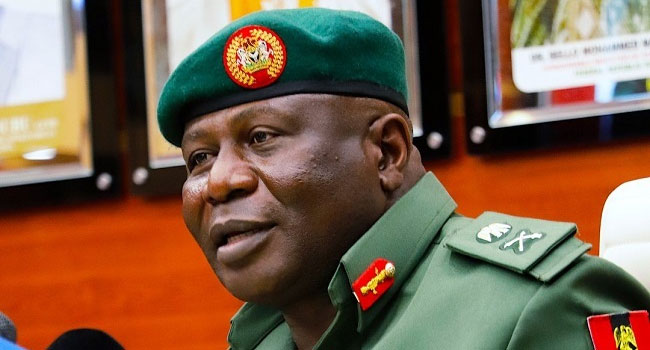The Senate on Tuesday received a request from President Muhammadu Buhari to raise the sum of N2,343,387,942,848 from multilateral and bilateral lenders, as well as the International Capital Market (ICM) through the issuance of Eurobonds.
The amount which is equivalent to USD$6,183,081,643.40 at the Budget Exchange Rate of USD$1/N379, is captured as New External Borrowing in the 2021 Appropriation Act (Item No.330), and meant to part-finance this year’s Budget Deficit of N5.602 trillion.
The request was contained in a letter addressed to the Senate President, Ahmad Lawan, and read during plenary.
According to the President, the request was made in line with the provisions of Sections 21(1) and 27(1) of the Debt Management Office (Establishment) Act, 2003.
He disclosed that Nigeria may be able to raise USD$3 billion or more, in a combination of tenors between 5 – 30 years.
Buhari explained that the Federal Government’s decision to raise the sum from the International Capital Market was due to the recent monetary policy stance that provides for very low interest rates and ease of moderating debt service cost.
He further disclosed that the proceeds of the USD6.183 billion (N2.343 trillion New External Borrowing in the 2021 Appropriation Act) would be used to fund specific Capital Projects in the Budget.
According to him, such projects are captured in priority sectors of the economy, namely: Power, Transportation, Agriculture and Rural Development, Education, Health, Provision of Counterpart Funding for Multilateral and Bilateral projects, Defence and Water Resources.
President Buhari’s letter, “Request For the Resolution of the National Assembly For: The Implementation of the New External Borrowing of N2.343 trillion (about USD6.183 Billion) In the 2022 Appropriation Act”, reads in part:
“The purpose of this Letter is to request for a Resolution of the National Assembly (NASS) to raise the sum of N2,343,387,942,848.00 (about USD 6,183,081,643.4O at the Budget Exchange Rate of USD1.00/N379) provided as New External Borrowing in the 2021 Appropriation Act (Item No. 330) to part-finance the Budget Deficit of N5.602 trillion.
“This request is in line with the provisions of Sections 21(1) and 27(1) of the Debt Management Office (Establishment, Etc.) Act, 2003 (DMO Act). Section 21(1) of the DMO states that “no external loan shall be approved or obtained by the Minister unless its terms and conditions shall have been laid before the National Assembly and approved by its Resolution”; while Section 27(1) states that the National Assembly may by a resolution approve, from time to time, standard terms and conditions for the negotiation and acceptance of external loans and issuance of guarantees”.
Implementation of the New External Borrowing in the 2021 Appropriation Act
“The President of the Senate may wish to recall that the 2021 Appropriation Act provides for N4,686,775,885,696.00 as New Borrowings(Item No. 328) to part-finance the 2021 Fiscal Deficit, of Which 50% or N2,343,387,942,848.00 (about USD 6,183,081,643.40 at the Budget Exchange Rate of USD1.00/N379) is specified as New External Borrowing.
“The President of the Senate may also wish to note that the allocation of #2.343 trillion to New External Borrowing in the 2021 Appropriation Act is consistent with the Nigeria’s Debt Management Strategy, which seeks amongst other objectives, to moderate
debt service costs by accessing relatively cheaper external funds, and to free-up space in the domestic market for other borrowers.
Funding Plan
“I wish to bring to the attention of the President of the Senate that the plan is to raise the sum of USD 6.183 billion from a combination of sources; namely: multilateral and bilateral lenders, as well as from the International Capital Market (ICM) through the issuance of Eurobonds.
“From recent bends in the ICM, it is now possible for Nigeria to raise funds in the ICM and this explains why we are proposing that the New External Borrowing in the 2021 Appropriation Act, should include issuing Eurobonds in the ICM.
“We estimate that Nigeria may be able to raise USD 3 billion or more, but not more than USD 6.183 billion (the amount provided in the 2021 Appropriation Act) in a combination of tenors between 5 30 years; the outcome would, however, be determined when Nigeria approaches the market.
“The President of the Senate may further wish to note that not only is the ICM now open to issuers like Nigeria and Interest Rate lower than the levels in 2020, given the recent monetary policy stance, as well as, rising levels of inflation, the level of liquidity in the domestic market has decreased while. domestic Interest Rates are beginning to rise.
“Therefore, accessing the ICM will be relatively cheaper thereby moderating debt service cost, and it will also contribute to the level of External Reserves.”
Utilisation of Proceeds of New External Borrowing
“The proceeds of the USD6.183 billion N2.343 trillion New External Borrowing in the 2021 Appropriation Act) will be used to found specific Capital Projects in the Budget.
“This includes projects from priority sections of the economy, namely: Power, Transportation, Agriculture and Rural Development, Education, Health, Provision of Counterpart Funding for Multilateral and Bilateral projects, Defence and Water Resources.”



